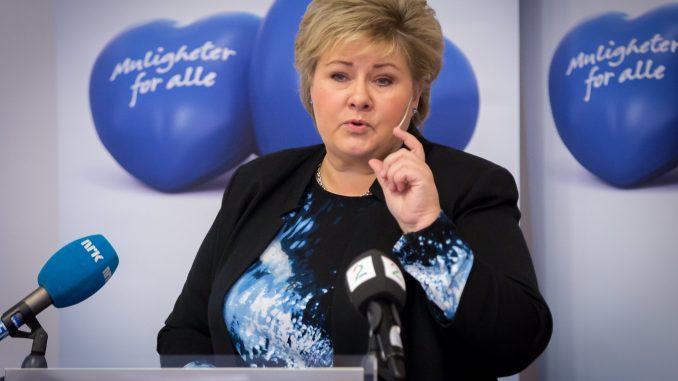
At a recent conference, Norwegian Prime Minister Erna Solberg highlighted the importance of turbocharging the fight for gender equality, noting that the Covid-19 pandemic has hit women particularly hard and positing that gender equality is ‘essential for a sustainable recovery’ from the economic crisis caused by the coronavirus outbreak.
Speaking at the Reykjavík Global Forum, Solberg expressed her concern at an ‘alarming’ rise in women’s poverty, as well as an escalation in acts of violence against women and girls everywhere. She also remarked on the unfair burden of unpaid work shouldered by women during the crisis, even in the world’s most advanced economies.
It’s an issue of global concern. Recent reports from the US have indicated that as many as one in four women are considering leaving the workforce or scaling back their career in the wake of the pandemic, threatening to set back years of progress. The study revealed that mothers were three times as likely as fathers to take on the lion’s share of housework and childcare amid the pandemic and asserted that four times more women than men dropped out of the US labour force this September alone: a predictable, yet disappointing development.
Equal opportunities equal greater rewards
Solberg is hardly the only one to point out the symmetry between progress in gender equality policy and corporate gains—indeed, a number of studies have shown that companies and economies are more productive and resilient when gender equality is made a priority. One study from McKinsey projected a global GDP boost of $28 trillion over the next five years if the gender gap in the workforce were closed.
For gender equality to be fully realised, however, legacy issues around fair participation in society would need to be overhauled. Women can only experience equal opportunities at work if they can enjoy the same privileges as their male counterparts outside of it. This means levelling up women’s access to education, financial and legal systems, as well as shifting the cultural beliefs that underpin discrimination.
There’s a long way to go. According to the World Bank, 190 million fewer women than men have a bank account, while 59 countries have no laws prohibiting sexual harassment or abuse in the workplace. Depressingly, OECD figures show that women spend 300 percent more time on unpaid care than men.
Spearheading the movement
Encouragingly, some major companies are already focusing on initiatives designed to close the gender gap. French food giant Danone, for example, is spearheading the OECD-supported Business for Inclusive Growth initiative (B4IG), which has earned it a place on the Bloomberg Gender-Equality Index (GEI). Danone has committed to implementing a raft of gender-neutral policies, including measures supporting flexible working hours, wage equality and extra support for women through targeted training and mentoring programs.
Another global leader which, like Danone, recently featured on a Spanish list of the country’s leading companies with the best practices in diversity and inclusion is Santander. The bank routinely tops the GEI and has launched gender equality initiatives around the world. Its BEST Africa (Building Equality through Sustainable Tourism in Africa) scheme supports women-led businesses related to sustainable tourism – one of the sectors hardest hit by Covid-19.
Santander is also backing banking and education interventions in Argentina and Chile to promote gender equality and runs multiple projects in Spain to empower women in the workplace. The projects include initiatives to promote women’s leadership and to help victims of gender-based violence to access the job market.
Counting the corporate benefits
There’s plenty of evidence to suggest that forward-thinking companies reap the bottom-line benefits of a more positive approach to diversity and inclusion, making them more innovative and profitable. Diverse teams are more likely to develop innovative ideas: a broader range of perspectives generates greater creativity and results in ideas that are more likely to resonate with customers.
Research also shows that top talent is more attracted to diverse work environments, especially in the US and Europe. A study by job site Glassdoor showed that two-thirds of job seekers consider workforce diversity when considering an employment offer. Senior female candidates are particularly attuned to the diversity of work environments, according to a survey by PWC.
Moreover, investors – especially from culturally liberal industries – often place greater value on companies that demonstrate best practices, including gender-diverse recruitment and retention programs. It’s not uncommon, for companies to enjoy a boost in share prices after winning kudos for diversity initiatives.
Time to press restart on gender equality
Even before the coronavirus pandemic, the World Economic Forum’s 2020 Gender Gap Report warned that inequality was hampering economic and social development, estimating that, at the current rate of progress, it would take ten generations (257 years) to achieve gender parity. That the failure to create greater fairness has not only worsened the Covid-19 crisis but may constrict the speed of global recovery, is difficult to contest.
There could be a silver lining, though. As we rebuild our damaged infrastructure, the pandemic could allow us to reset the button on gender equality, establishing it as a platform from which to launch a faster, fairer route to a more resilient recovery. With many organisations navigating rough waters and overhauling their strategies to recalibrate their response to the global economic downturn, hopefully more firms will take a leaf out of Danone and Santander’s book and determine that taking the lead on putting women first is a step towards a more sustainable and prosperous future.
Image credit: Høyre/Flickr


Leave a Reply